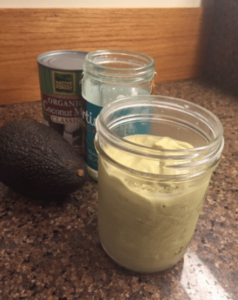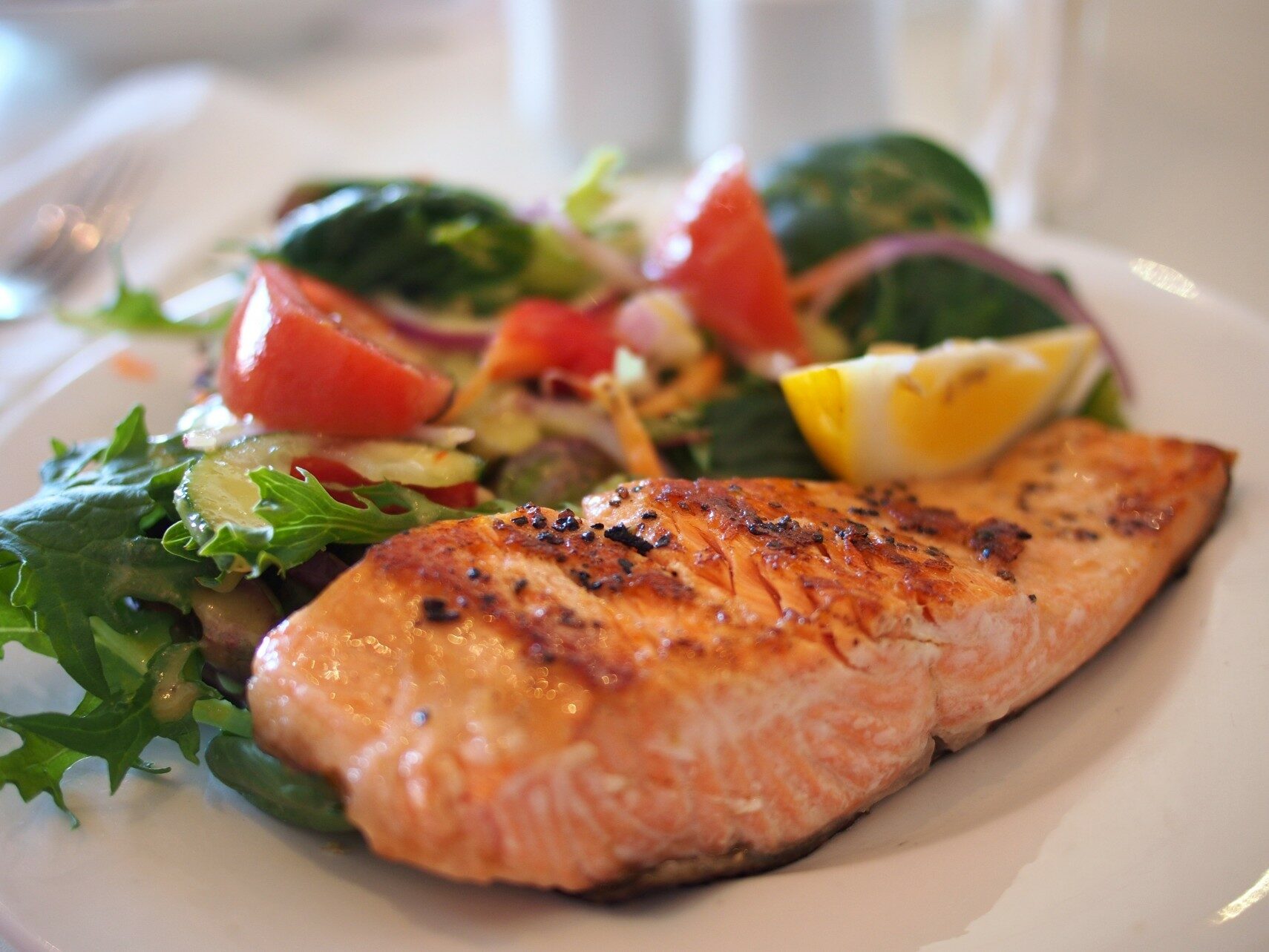Let’s get over our fear of fat! Here’s how to navigate the good stuff…
Great Fats
Rich in healthy monounsaturated fats:
- Avocados
- Avocado oil
- Beef tallow
- Extra virgin olive oil
- Olive oil, pure
- Lard
- Macadamia nuts
- Olives
Healthy, unprocessed cooking fats and high-fat foods:
- Beef, grassfed
- Bone broth—a great post-work recovery drink or snack rich in amino acids too!
- Cacao and cacao beans, unsweetened
- Chicken thighs and dark meat, organic pastured or free-range
- Cocoa butter
- Dark chocolate, 85%-100%
- Dairy, full-fat from grass-fed, pasture-raised animals (goat preferred over cow dairy) – if no sensitivity/allergy!
- Duck, pastured organic
- Duck fat
- Egg yolks from pastured chickens
- Fish oil
- Fish, wild caught: sardines, salmon, trout, mackerel; some white fish, and tuna/ahi in moderation
- Ghee, preferably from grassfed cows
- Lamb
- Macadamia nut oil, not for cooking
- MCT Oil
- Nuts, in moderation, preferably raw, organic, soaked: almonds, cashews, walnuts, pecans,
- Pork
- Quail
- Seeds, preferably raw and organic: sunflower seeds, pumpkin seeds, chia seeds, flaxseed, and brazil nuts
- Turkey, dark meat
High in Saturated Fats
Only in certain health situations does saturated fat consumption need to be limited; some people just do better keeping saturated fats lower like 1/3 of total fat intake. Otherwise, it’s a myth that saturated fats are bad. For example, coconut oil contains MCT oil for clean-burning energy, it’s anti-microbial so it fights yeast/candida overgrowths, boosts the metabolism, fuels weight loss, and supports skin health. And because of the fatty acid composition, coconut oil is absorbed more easily that other fats.
- Bacon
- Bacon fat
- Butter, from grassfed cows
- Coconut oil, virgin and unrefined
- Coconut milk—most will have some guar gum but try to avoid coconut milk with other additives. Get in BPA free cans.
- Coconut flour
- Unsweetened coconut flakes, coconut chips, and finely shredded coconut
- Coconut meat
- Coconut butter
OK Fats (to have in moderation)
Try to avoid in excess:
- Walnut oil*
- Sesame oil*
- Pumpkin seed oil*
- Raw nut butters and seed butters
- “Flours” from nuts and seeds
- Cheeses
- Full-fat yogurt
- Fermented yogurt
*Use as dressing/topping; don’t expose to heat or use for cooking
Fats to Avoid
Fats that are processed and too high in omega-6’s. These guys are the real bad guys when it comes to developing heart disease, etc., and they should be avoided at all costs:
- Canola oil
- Corn oil
- Cottonseed oil
- Grapeseed oil
- Soybean oil (soy)
- Safflower oil
- Sunflower oil
- Peanut oil
- Peanut sauces
- Rice bran oil
- Fat-free and low-fat products (i.e. low-fat yogurt or diet foods; highly processed and too much sugar/chemicals added)
- Fake butters & margarine (I Can’t Believe it’s Not Butter, etc.)
- Fish oils older than 30 days or exposed to heat
- Hydrogenated oils (and partially hydrogenated oil)
- Shortening (Crisco)
- Trans fats
- Anything labeled with “vegetable oil”
Also… there are numerous foods prepared with these oils and/or trans fats that you want to avoid. Some of the most common include:
- Chips, crackers and carb-rich snacks
- Fast food
- Fried foods
- Frozen dinners
- Packaged pre-made mixes for cakes, pancakes, cookies, chocolate milk, etc.
- Pre-made crusts, doughs and breads
- Any delicate fats that have been exposed to high heat, i.e. nut-based oils used for cooking, roasted nut sauces and dressings, etc.
- Roasted nuts and seeds
Depending on your situation you may have to take extra careful consideration in avoiding bad fats, i.e. in times of fixing metabolic health and/or underlying health conditions.
How much dietary fat per day?
If you’re on a 2,000-calorie diet, then about 90 grams of fat per day is about the minimum you want. This is 810 calories from fat, 40% of your daily intake. Up to 60% fat from total calories is acceptable, which would be 135 grams per day for a 2,000-calorie diet. Adjust to your dietary and caloric needs.
Avoid too much dairy. Butter and eggs are fine, but keep other forms of dairy to a minimum or eliminate entirely (milk, yogurt, cheese, etc), especially if dairy addiction and symptoms of dairy intolerance are present.
I often get asked, “What are options to get more fat in?” Often it’s all about using fats to cook with, getting them in your protein (fish, chicken thighs and grassfed beef, for example), or adding things like coconut, avocado, nuts and seeds to your meals.
BONUS: 3 recipes that are a high-fat way to start your day:
Go-To Veggies, Eggs and Avo
- 2 pastured eggs (5g fat)
- 1 tbsp. butter for cooking (12g)—subs: ghee, coconut oil, avocado oil
- Half avocado (15g)
- Chopped greens and veggies to boost this meal into a nutritional powerhouse (our favorites: dino kale or spinach, fennel, green onion, mushroom, bell pepper).
- Add salsa, Rao’s tomato sauce or “clean” basil pesto for topping
Directions: Sauté veggies in cooking fat first for at least a few minutes, add eggs (either crack in for sunny-side up or whisk for a scramble/frittata style), cook until done. Plate and serve with avocado.
FOR AIP DIETS: Replace eggs with breakfast sausage instead! USwellnessmeats.com has great options, and I also love Applegate Organics apple sausage. Use ghee or another fat instead of butter.
BONUS FAT: Have this with bacon, and or coffee or tea containing 1 tbsp coconut oil and cinnamon for another 14g of fat! (Fat in coconut oil vs. milk? Coconut milk has 4g fat per tbsp, which is less than the oil.)
NEED CARB? If this is post-workout or you just need more carbs then toss in pre-cooked kabocha or butternut squash cubes, sweet potato cubes or long-fermented sourdough toast.
High-fat nutty grain-free porridge (egg free):
(FYI: this ingredient list is an estimate of what I make, so feel free to tweak ingredients and amounts to your liking!)
- ½ small avocado, mashed
- 2 tbsp finely shredded coconut, unsweetened
- 2 tbsp ground flax and/or chia seed
- 4 oz non-dairy milk, unsweetened
- 4 oz water, filtered not tap
- 2 tbsp Great Lakes collagen powder (or “clean” protein powder)
- 1 tbsp pumpkin seeds
- 1 tbsp hemp seeds
- 1-2 tbsp nuts: cashews, almonds or walnuts, crushed
- 1-2 tsp raw honey
- 1-2 tsp cinnamon
- ½ tsp salt
Directions: Mix water, milk, collagen/protein and cinnamon in shaker bottle. In a bowl, mash avocado and add shredded coconut, ground chia/flax; mix. Pour liquid into bowl and mix with other ingredients thoroughly until a porridge consistency is reached. Add the rest of the ingredients, mix well, and enjoy!
This is about ~500 calories, with about 35g of fat!
High-Fat Smoothie Bomb
 1/2 cup coconut milk (or ¼ cup coconut milk, ¼ cup water)
1/2 cup coconut milk (or ¼ cup coconut milk, ¼ cup water)- 1/2 to full avocado
- 1-2 tbsp coconut butter
- 1/2 tsp vanilla
- 1-3 tsp cinnamon (I like a lot hehe)
- 3 tbsp Great Lakes Gelatin Powder (or your protein powder of choice)
- Himalayan sea salt, to taste
- Optional sweetener: stevia for very low carb, or a drizzle honey or low-GI fresh fruit (berries)
- 5 ice cubes
Directions: Blend in high-powered Vitmax or equivalent. You can add other items like cashews, or top with coconut flakes after mixing for a crunch.
This recipe is AIP friendly and keeps you full for hours!

